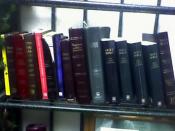Throughout history there have been developments that have had a dramatic affect on a period of time. Many happenings during the reformation and scientific revolution have made long lasting impacts for further inventions and ideas. A few things in which inspired new developments are the humanist movement, Gutenberg's printing press, and the use of the scientific method.
The humanist movement was part of the Renaissance, which caused people to believe that knowledge should encourage a single person's creativity. Humanism according to the "Prentice Hall World History Connections To Today" textbook is defined as an intellectual movement at the heart of the Italian Renaissance that focused on worldly subjects rather than on religious issues. Humanist scholars hoped that the wisdom they had of ancient Greeks and Romans would help them to understand their time. A few subjects that were studied by the Italian humanists were grammar, rhetoric poetry. These subjects were known as "Studia Humanitas."
Interpreters of the ancient data did not believe anything they learned without thoroughly questioning every small and large detail that could be found. One of the most famous Italian humanists is Francesco Petrarch. During his life from 1304 to 1374, the early renaissance humanist searched for every piece of Greek and Roman manuscripts he could get his hands on. After finding all that he could, he began writing his own literature. He wrote "Sonnets to Laura," which was a book that consisted of love poems that were inspired by a woman he knew only by his eyes. These poems later motivated other writers. The Northern European humanist scholars were very much like the humanists of the Italian Renaissance. Both the Europeans and Italians stressed the learning and renewal of the classical learning. This "classic learning" was a way to teach young children about religious and...


